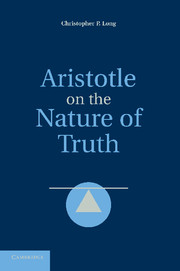Book contents
- Frontmatter
- Contents
- Prolegomenon
- Aristotle on the Nature of Truth
- 1 The Saying of Things
- 2 A History of Truth as Cor-respondence
- 3 Saving the Things Said
- 4 By Way of Address
- 5 By Way of Response
- 6 The Truth of Nature and the Nature of Truth in Aristotle
- 7 On Saying the Beautiful in Light of the Good
- 8 Ecological Justice and the Ethics of Truth
- Works Cited
- Index of Passages Cited
- General Index
8 - Ecological Justice and the Ethics of Truth
Published online by Cambridge University Press: 06 December 2010
- Frontmatter
- Contents
- Prolegomenon
- Aristotle on the Nature of Truth
- 1 The Saying of Things
- 2 A History of Truth as Cor-respondence
- 3 Saving the Things Said
- 4 By Way of Address
- 5 By Way of Response
- 6 The Truth of Nature and the Nature of Truth in Aristotle
- 7 On Saying the Beautiful in Light of the Good
- 8 Ecological Justice and the Ethics of Truth
- Works Cited
- Index of Passages Cited
- General Index
Summary
This sort of justice, then, is complete virtue, although not simply, but toward another [πρὸς ἕτερον]. And because of this, it often seems that justice is the most excellent of the virtues and “neither the evening nor the morning star is so wondrous,” and we say proverbially: “in justice all virtue is collectively in one.”
Aristotle, Nicomachean EthicsEcological justice is cultivated by an ethics of truth: it is nourished by concerned address and attuned response, and it grows over time in and through the attempt to put things into their proper words. The ethics of truth is rooted in a twofold responsibility that conditions the way human-beings in-habit the world. At the surface, this twofold responsibility announces itself in our rudimentary encounters with perceptible things; from the depths, it is heard in our attempts to articulate the intelligibility of things. At the surface, responsibility is twofold insofar as our encounters in perceiving at once lend themselves to our perceptive abilities to respond and awaken us to an insistent unicity that enjoins response even as it remains recalcitrant to human articulation. From the depths, responsibility is twofold insofar as our abilities to respond intelligibly to the coherent integrity of things awaken us to the expression of the whole that presses upon us an obligation to speak in light of the good and the beautiful, however dimly discerned. The human ability to respond thus opens human-being to responsibility from two directions.
- Type
- Chapter
- Information
- Aristotle on the Nature of Truth , pp. 242 - 254Publisher: Cambridge University PressPrint publication year: 2010



